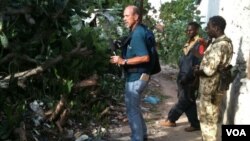The Committee to Protect Journalists (CPJ) has discussed what it calls repressive and harsh treatment of the media with high-ranking members of Ethiopia's government.
Board members from the Committee to Protect Journalists and the Africa Media Initiative met with a senior figure in the government of Ethiopian Prime Minister Meles Zenawi this week, and called for the release of journalists being held in the country.
The Committee to Protect Journalists says Ethiopia is holding eight journalists in prison, only neighboring Eritrea holds more jailed journalists in Africa.
The two-hour-long meeting in Addis Ababa focused on those journalists and Ethiopia's overall treatment of independent media. Independent publishers and media members say the country's very broad 2009 anti-terrorism law has had a "chilling" effect on press freedom in the private media sector.
The law allows lengthy prison sentences for reporting that gives encouragement to groups the government labels terrorists.
The Committee to Protect Journalists says authorities are holding three Ethiopian journalists and two Swedish journalists on charges of anti-government plots and terrorism. All the journalists have denied wrongdoing.
CPJ representative in Nairobi, Tom Rhodes, says the journalists are being held on "trumped-up" terrorism charges.
"None us thought for example that these two Swedish journalists Martin [Shibbye] and Johan [Perrson] would be detained for this long, and yet they have been, which makes us think they may be there for the long haul," said Rhodes.
According to a CPJ press release, Ethiopian officials say the law is not an instrument for censorship or to attack press freedom, but rather is used to help Ethiopians enjoy their constitutional rights.
Under the law, prominent journalists who have been critical of the government and human rights in Ethiopia face extreme jail sentences.
"Eskinder Nega, who is quite an active voice in Ethiopia, and he is facing a life sentence, and that is not only a great shame for Eskinder, but for the Ethiopian people," added Rhodes. "He sort of represents the voice struggling to push for democracy and to have these sorts of selfless voices silenced is really a tragedy."
Last month, VOA News Correspondent Peter Heinlein was arrested and held overnight in Addis Ababa on charges of "illegal reporting."
The Committee to Protect Journalists said the government expressed support for it and the African Media Initiative to host seminars and workshops in hopes of strengthening the country's independent media.
Board members from the Committee to Protect Journalists and the Africa Media Initiative met with a senior figure in the government of Ethiopian Prime Minister Meles Zenawi this week, and called for the release of journalists being held in the country.
The Committee to Protect Journalists says Ethiopia is holding eight journalists in prison, only neighboring Eritrea holds more jailed journalists in Africa.
The two-hour-long meeting in Addis Ababa focused on those journalists and Ethiopia's overall treatment of independent media. Independent publishers and media members say the country's very broad 2009 anti-terrorism law has had a "chilling" effect on press freedom in the private media sector.
The law allows lengthy prison sentences for reporting that gives encouragement to groups the government labels terrorists.
The Committee to Protect Journalists says authorities are holding three Ethiopian journalists and two Swedish journalists on charges of anti-government plots and terrorism. All the journalists have denied wrongdoing.
CPJ representative in Nairobi, Tom Rhodes, says the journalists are being held on "trumped-up" terrorism charges.
"None us thought for example that these two Swedish journalists Martin [Shibbye] and Johan [Perrson] would be detained for this long, and yet they have been, which makes us think they may be there for the long haul," said Rhodes.
According to a CPJ press release, Ethiopian officials say the law is not an instrument for censorship or to attack press freedom, but rather is used to help Ethiopians enjoy their constitutional rights.
Under the law, prominent journalists who have been critical of the government and human rights in Ethiopia face extreme jail sentences.
"Eskinder Nega, who is quite an active voice in Ethiopia, and he is facing a life sentence, and that is not only a great shame for Eskinder, but for the Ethiopian people," added Rhodes. "He sort of represents the voice struggling to push for democracy and to have these sorts of selfless voices silenced is really a tragedy."
Last month, VOA News Correspondent Peter Heinlein was arrested and held overnight in Addis Ababa on charges of "illegal reporting."
The Committee to Protect Journalists said the government expressed support for it and the African Media Initiative to host seminars and workshops in hopes of strengthening the country's independent media.




